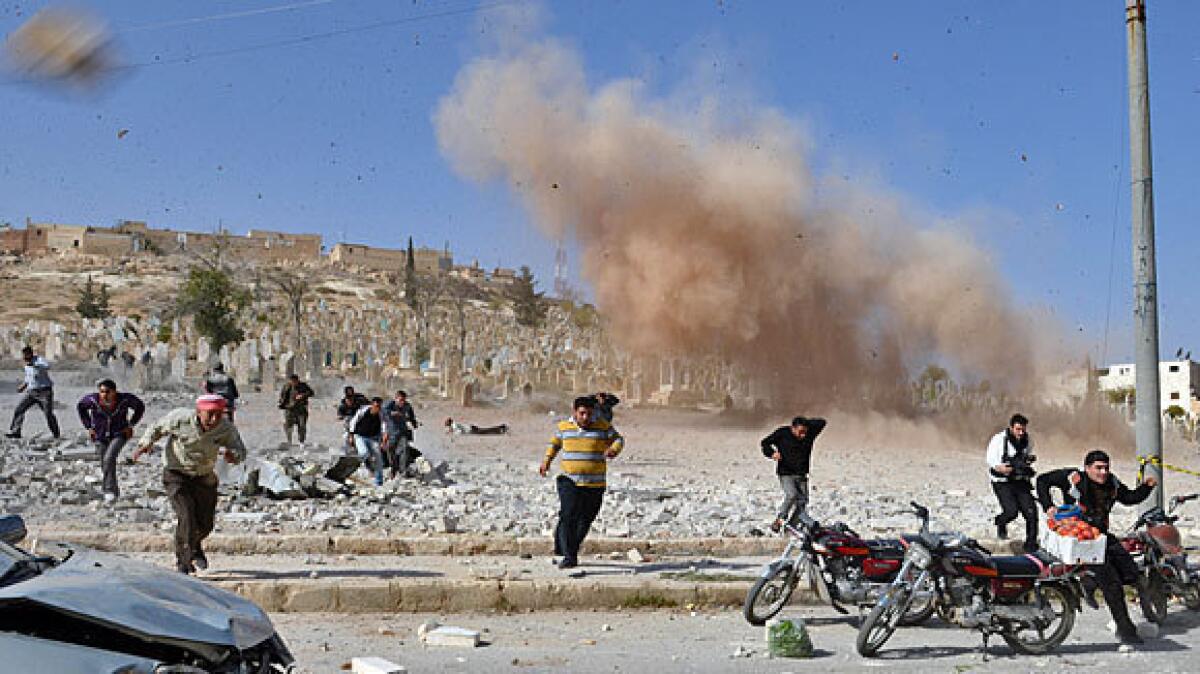Bombing in Syria capital injures 11; exiles plan for a government

BEIRUT â The latest in a string of bombings rocked Syriaâs capital, Damascus, on Sunday as deeply divided Syrian opposition figures outside the country moved toward creating a unified government in exile.
The explosion near a trade union office injured 11 people, the official news service reported.
Meanwhile, Syrian opposition activists began talks in the Persian Gulf state of Qatar in a bid to revitalize their fractured movement. Deep divisions among the opposition have frustrated the United States and other governments seeking to work with a dissident front united in efforts to oust Syrian President Bashar Assad.
U.S. Secretary of State Hillary Rodham Clinton and others have called for a more unified opposition coalition including representatives from inside Syria and members of the nationâs minority groups, such as Christians and Alawites. Assad and many of his top security chiefs are adherents of the Alawite sect, an offshoot of Shiite Islam.
The Syrian National Council, the best-known exiled opposition group, is seeking to retain its stature as the preeminent faction and position itself as the basis for a government in exile. Some critics have assailed the council as top-heavy with exiles who have lived outside Syria for decades, and said itâs dominated by the Muslim Brotherhood, the pan-Arab Islamist group that has not had a presence in Syria for years.
The United States and other nations are said to be backing a proposal from a well-known exiled dissident, Riad Seif, to set up a new umbrella group that would include representation of rebel fighters, opposition military councils, the external opposition and others. The Syrian National Council would be part of the revamped coalition but would not dominate.
Seif, a prominent businessman and former Syrian lawmaker, told reporters in Doha, Qatarâs capital, on Sunday that he would not be a candidate to lead any government in exile.
The proposed remaking of the opposition has set off a new round of internal squabbling. Representatives of the Syrian National Council are reported to be seeking a more influential role in the new coalition. Talks are expected to continue in Doha this week.
The official Syrian news service blamed Sundayâs bombing on âterrorists,â the governmentâs usual label for armed rebels seeking to overthrow Assad.
The target of the attack was not immediately clear. The district where the bomb exploded is home to a trade union office, a hotel and several security installations. There was no confirmation of fatalities.
The attack once again seemed to demonstrate rebelsâ ability to strike at the heart of the capital despite heavy security and a plethora of checkpoints throughout Damascus.
Rebels appear to be stepping up bomb attacks in and around the capital, where a number of car bombings and other blasts have hit in recent weeks. The string of bombings has come as Syrian troops have pushed many armed rebels out of city neighborhoods and into outlying districts.
Elsewhere in Syria, opposition activists said Sunday that rebels had captured an oil field near the Iraqi border after several days of combat. Oil was an important source of revenue for Damascus before Western sanctions imposed on Assadâs government drastically cut exports. There was no independent confirmation of the oil fieldâs seizure.
Special correspondent Rima Marrouch contributed to this report.
More to Read
Sign up for Essential California
The most important California stories and recommendations in your inbox every morning.
You may occasionally receive promotional content from the Los Angeles Times.









